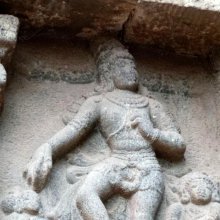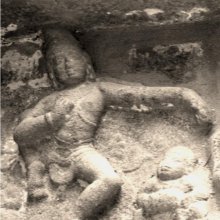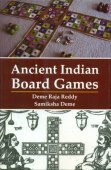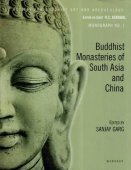In, Iñ, Iṉ, Īṉ: 10 definitions
Introduction:
In means something in Hinduism, Sanskrit, the history of ancient India, Hindi, Tamil. If you want to know the exact meaning, history, etymology or English translation of this term then check out the descriptions on this page. Add your comment or reference to a book if you want to contribute to this summary article.
Images (photo gallery)
(+3335 more images available)
In Hinduism
Vyakarana (Sanskrit grammar)
Source: Wikisource: A dictionary of Sanskrit grammarIñ (इञ्).—(l) kṛt. affix (इ), in the sense of verbal activity applied to any root, the word so formed being used in the fem. gender and in connection with narration or in interrogation; e.g. कां त्वं कारिमकार्षीः । सर्वौ कारिमकार्षम् । (kāṃ tvaṃ kārimakārṣīḥ | sarvau kārimakārṣam |) cf. Pāṇini III.3.110: (2) kṛt. affix in the sense of verbal activity applied to the roots वप् (vap) and others e.g. वापिः, वासिः (vāpiḥ, vāsiḥ) etc. cf. P.III.3.108 Vārt. 7;(3) tad-affix इ (i) in the sense of offspring applied to a noun ending in अ; e.g, दाक्षिः (dākṣiḥ) cf. P.IV.1. 95-7, 153.
--- OR ---
1) In (इन्).—Kṛt affix इ (i) applied to the roots कृ, हृ, ग्रह (kṛ, hṛ, graha), and भृ (bhṛ) when they are preceded by certain words like स्तम्ब (stamba) etc. in certain senses; e. g. स्तम्बकरिः, फलेग्रहिः, आत्मंभरिः (stambakariḥ, phalegrahiḥ, ātmaṃbhariḥ); cf. P.III. 2.24-7;
2) In.—Kṛt affix इन् (in) (णिनि (ṇini)) prescribed by P.III.3.170 e. g. अवश्यं-कारी, शतंदायी (avaśyaṃ-kārī, śataṃdāyī)

Vyakarana (व्याकरण, vyākaraṇa) refers to Sanskrit grammar and represents one of the six additional sciences (vedanga) to be studied along with the Vedas. Vyakarana concerns itself with the rules of Sanskrit grammar and linguistic analysis in order to establish the correct context of words and sentences.
India history and geography
Source: Project Gutenberg: Castes and Tribes of Southern India, Volume 1In (“sweet”) is one of the gotras (clans) among the Kurnis (a tribe of South India). Kurni is, according to the Census Report 1901, “a corruption of kuri (sheep) and vanni (wool), the caste having been originally weavers of wool”. The gotras (viz., In) are described as being of the Brāhman, Kshatriya, and Vaisya sub-divisions of the caste, and of Shanmukha’s Sudra caste.

The history of India traces the identification of countries, villages, towns and other regions of India, as well as mythology, zoology, royal dynasties, rulers, tribes, local festivities and traditions and regional languages. Ancient India enjoyed religious freedom and encourages the path of Dharma, a concept common to Buddhism, Hinduism, and Jainism.
Languages of India and abroad
Sanskrit dictionary
Source: DDSA: The practical Sanskrit-English dictionaryIn (इन्).—6, 8 P. Ved.
1) To go.
2) To advance or rush upon, press upon; drive.
3) To invigorate.
4) To force, compel.
5) To drive away, remove.
6) To take possession of, pervade, fill.
7) To dispose.
8) To be lord or master (of anything).
Source: Cologne Digital Sanskrit Dictionaries: Monier-Williams Sanskrit-English DictionaryIn (इन्):—See √inv.
[Sanskrit to German]
Sanskrit, also spelled संस्कृतम् (saṃskṛtam), is an ancient language of India commonly seen as the grandmother of the Indo-European language family (even English!). Closely allied with Prakrit and Pali, Sanskrit is more exhaustive in both grammar and terms and has the most extensive collection of literature in the world, greatly surpassing its sister-languages Greek and Latin.
Hindi dictionary
Source: DDSA: A practical Hindi-English dictionaryIn in Hindi refers in English to:—(pro) these; ~[ko] to these..—in (इन) is alternatively transliterated as Ina.
...
Kannada-English dictionary
Source: Alar: Kannada-English corpusIn (ಇನ್):—
1) [adverb] henceforth; hereafter.
2) [adverb] so far; as of now; still yet.
3) [adverb] different (from the one being referred, understood or meant).
--- OR ---
Īn (ಈನ್):—[verb] (an animal) to give birth to; to deliver (a young one).
Kannada is a Dravidian language (as opposed to the Indo-European language family) mainly spoken in the southwestern region of India.
Tamil dictionary
Source: DDSA: University of Madras: Tamil LexiconIṉ (இன்) < இனி-மை. [ini-mai.] Always in compound: [K. iṉ.] adjectival Sweet, pleasant, agreeable; இனிய. இன்சொ லினிதீன்றல் காண்பான் [iniya. inso linithinral kanpan] (திருக்குறள் [thirukkural], 99). — noun Sweetness, pleasantness; இனிமை. இன்வள ரிளம் பிறை [inimai. invala rilam pirai] (சீவகசிந்தாமணி [sivagasindamani] 1008).
--- OR ---
Iṉ (இன்) particle
1. An ablative ending; ஐந்த னுருபு. [aintha nurupu.] (நன். [nan.] 299.)
2. A locative ending; ஏழனுருபு.. [ezhanurupu..] (திருக்கோவையார் [thirukkovaiyar] 19, உரை. [urai.])
3. A sign of the past tense; இறந்தகாலவிடைநிலை. உறங்கினாள். [iranthagalavidainilai. uranginal.]
4. An euphonic augment; சாரியை. வைப்பிற்கோர் வித்து [sariyai. vaippirkor vithu] (திருக்குறள் [thirukkural], 24).
--- OR ---
Īṉ (ஈன்) noun < இ³. [i³.]
1. This place; இவ்விடம். ஈன்வரு கென்ன [ivvidam. invaru kenna] (தணிகைப்புராணம் வீராட்ட. [thanigaippuranam viratta.] 89).
2. This world; இவ்வுலகம். ஈனு மும்பரும் பெறலருங் குரைத்தே [ivvulagam. inu mumbarum peralarung kuraithe] (ஐங்குறுநூறு [aingurunuru] 401).
--- OR ---
Īṉ (ஈன்) [īṉ(ṉu)tal] 8 transitive verb [Telugu: īnu, Kanarese, Malayalam: īn.]
1. To bear, bring forth, yean; கருவுயிர்த்தல். [karuvuyirthal.] (நாலடியார் [naladiyar] 400.)
2. To produce, yield, bring into being; உண்டாக்குதல். நயனீன்று நன்றி பயக்கும் [undakkuthal. nayaninru nanri payakkum] (திருக்குறள் [thirukkural], 97).
--- OR ---
Īṉ (ஈன்) noun
1. Ainee wood; மரவகை. [maravagai.] Local usage
2. Sal; ஆச்சா. (சித். அக.) [acha. (sith. aga.)]
Tamil is an ancient language of India from the Dravidian family spoken by roughly 250 million people mainly in southern India and Sri Lanka.
Nepali dictionary
Source: unoes: Nepali-English DictionaryIn (इन्):—suffix. forms feminine of masculine nouns referring to animate beings, e.g. दुलहिन [dulahina ] (bride), बाघिन [bāghina ] (tigress), नागिन [nāgina ] (snake's wife/female snake), etc.;
Nepali is the primary language of the Nepalese people counting almost 20 million native speakers. The country of Nepal is situated in the Himalaya mountain range to the north of India.
See also (Relevant definitions)
Starts with (+2285): Ihatre, Ikkara, Imcara, Imcaramgare, Imcarami, Imcari, Imce, Imcevogu, Imcil, Imcu, Imcupatti, Imcuvogu, Imdadatta, Imdaki, Imdamahakamua, Imdamamdava, Imdanakamda, Imdani, Imdara, Imdasani.
Ends with (+9980): A mi qin, A-karadayin, Aagyaadheen, Abahuvadin, Abakirnin, Abarhin, Abarohin, Abdhijivin, Abdhiviharin, Abdin, Abhagin, Abhakshyabhakshin, Abhangin, Abhasin, Abhasvaracakravartin, Abhasvarachakravartin, Abhavin, Abhayadayin, Abhayagirivasin, Abhayanandin.
Full-text (+232739): Kala, Bala, Bhava, Padma, Maya, Sama, Vijaya, Jaya, Naga, Guna, Shankha, Rasa, Danda, Mana, Dharana, Mahendra, Vasi, Varuna, Sara, Indra.
Relevant text
One of your search terms exceeds the minimun character amount per search term. This amount currently equals 2.
No search results for In, Iñ, Iṉ, Īṉ, Īn, Een; (plurals include: Eens) in any book or story.
Related products
(+1466 more products available)










